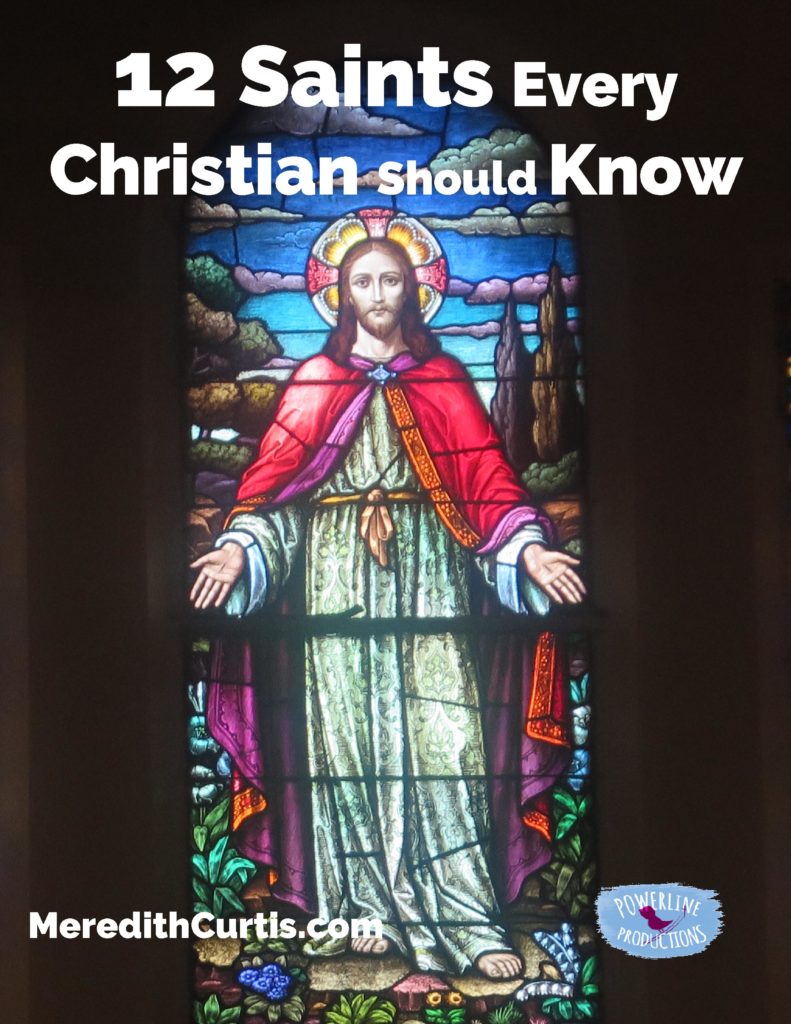Since it is All Saints Day, I thought it would be a great time to talk about Super-Hero Saints from the olden days.
These men inspire me to follow Jesus with all my heart and make a difference in my generation. I hope this post will make you want to learn more about these amazing saints!

Saint Polycarp (69-155), bishop of Smyrna, was mentored by Apostle John the Beloved. He pastored his flock faithfully in the midst of terrible persecution, but managed to make it to the age of 86. At this point, the Emperor decided to execute Polycarp, but gave him permission to recant his faith in Christ. When he heard he was a wanted man, he refused to flee, but waited patiently for the soldiers to take him to the arena. When asked to recant, he replied, “86 years I have served him and he has done me no wrong. How can I blaspheme my King and my Savior.
Saint Eusebius (260-340), bishop of Caesarea, is considered the Father of Church History. He escaped execution during Emperor Diocletian’s “Great Persecution,” but was imprisoned. After Emperor Constantine’s Edict of Milan, Eusebius returned to pastoring his flock. Today, we remember him for Ecclesiastical History, a 10-volume work covered Church history from Jesus to his time. I read this book and I love it! It’s so awesome to read about the early church! In addition, he wrote a 15-volume work explaining how Old Testament prophecies were fulfilled in Christ. He also wrote a history of the world.

Saint Nicholas (270-343), bishop of Myra in Asia Minor is remembered for his kind heart and generosity. He loved children and they loved him. During the “Great Persecution” of Emperor Diocletian, he was imprisoned and exiled. Saint Nicholas attended the Council of Nicaea, a defender of Orthodoxy, defending the Deity of Christ, the Trinity, and Incarnation of Christ. He boldly denounced the heresies of Arius.
Saint Athanasius (296-373), the Archbishop of Alexandria, was exiled five times for his strong stand on the Deity of Christ and the Trinity. When the Church was divided over the heretical teachings of Arius who claimed that Jesus was not always one with the Father, Saint Athanasius firmly stood his ground on the Word of God. Throughout Christendom, there were fierce arguments. Emperor Constantine finally had enough and he called for a church council at Nicaea where the Nicene Creed was hashed out as a answer to Arius’ heresy. Athanasius’ works on the Incarnation of Christ helped to lay a strong foundation for sound doctrine in the Church.
Saint Augustine of Hippo (354-430) served faithfully once he finally gave his life to Christ. His younger years were wild and rebellious, but he had a praying mom. You can learn all about his testimony in his beautiful Confessions. Another of his works that is still read today is City of God that compares the earthly kingdom of Rome and the Kingdom of God. These two works should be read by everyone! I would have to say that Saint Augustine is the pre-eminent theologian of the first millennium of Church History.

Saint Patrick (389-493) was kidnapped by Irish pirates as a young rebellious teenager. Though his parents were devout Christians, he rejected their faith. Once he was a slave in Ireland, he remember Jesus and gave his life to him. God allowed to escape and get back to England where he decided to pursue ministry. The Lord called him to the Irish and stirred a love up in his heart for them. After years of schooling, he finally went to Ireland, but when he got there, he faced people steep in occultic practices and worship of demons. Many power encounters later, most of Ireland had given their hearts to Christ.
Pope Gregory the Great started life in a wealthy, influential Roman family, eventually becoming Mayor of Rome. He gave up his position and all his money to become a monk, loving the simple life of devotion to Jesus. Due to his past, he was often asked to help the popes out. Finally, he was asked to be pope and though he didn’t want to leave the monastery, he did his duty. Filled with love for the entire Church, he did his best to train priests to lovingly care for their flocks. You can read his Pastoral Care. However, he is also remembered for music: Gregorian chants and musical notation. Saint Gregory loved to worship with songs!
Saint Caedmon (circa 657-680) was a humble shepherd in a monastery. One night, everyone in the monastery was fellowshipping together, singing and telling stories. Caedmon went to the barn, ashamed because he couldn’t sing or tell stories. He prayed that God would allow him to sing Bible stories for His glory. God answered his prayer. The next morning, the started singing a beautiful song about Creation. Everyone who heard Caedmon’s songs loved them. He had such an anointing to sing God’s Word that he soon found himself shepherding people instead of sheep.

Saint Bede the Venerable (672-735) was sent to an abbey at the age of seven and lived there all his life. A Benedictine Monk, Bede love Jesus, loved to worship, love to study the word, and loved to work hard. He was always kind and loving. We remember him as the Father of English History because among his many, many works, he wrote Ecclesiastical History of the English People. Though its title is about the history of the English Church, it is THE resource for English history the time the Romans left to the the seventh century. His work is quoted in history books all the time!
Saint Boniface (675-754), an English Christian, wanted to reach the Germanic tribes of the Frankish Empire with the Gospel. Pope Gregory II commissioned him as an Apostle to the Germans.The folks that he ministered to worshipped an old oak tree, which they believed to be a god. Boniface chopped the oak tree down to show them that God was more powerful. When the “gods” did not strike Boniface down, the people converted to Christianity. Boniface used the wood to build a chapel.
Good King Wenceslas, or Saint Wenceslas (907-935) was the Duke of Bohemia. You may have heard the Christmas carol about him? He was a kind and good man, humbling himself at every turn. He would buy slaves and set them free. He fed the poor and needy from his table. Unfortunately, his brother was part of an assassination plot to take the throne for him. He is remembered for his love for Jesus.

Saint Frances of Assisi (1181-1226) was named after the Apostle John the Beloved, but renamed by his father “Frances” after the nation of France. He did not want his son to be a Christian like his wife. After many years of living to sin, Frances was radically saved when God appeared to him in a dream. He gave away all his wealth and worldly possessions. Eventually Frances became a monk, starting his order of Franciscan Monks. Frances loved to study God’s Word, pray, and sing. He wrote songs and told the common people stories about Jesus. He is said to have build the first nativity scene.
I am grateful for my brothers and sisters in Christ who have gone before and lived lives that brought glory and honor to Jesus! I want to live that way, too. And I want to teach my children to have real heroes!
At this time each year, our family celebrates the Super-Hero Saints with a Heroes for Jesus Party.
There are so many heroes to celebrate! I love teaching my children about heroes and heroines who are sold out for Jesus and have been used to change the world.
Do you want to have your own Heroes for Jesus Party?

Remember the Saints! Let them inspire you to follow Jesus wholeheartedly.
Warmly,
Meredith Curtis

